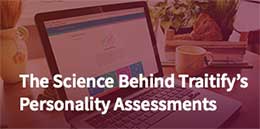When it comes to hiring, personality counts — in fact, according to a recent survey, nearly 80 percent of employers said they rank personality as the most important characteristic they look for in a job-seeker, well ahead of candidates’ actual skills. But during a job interview, you may not get an accurate read on the personality of the individual in front of you. So how do you know — before making an offer — whether the candidate you’re considering will be a good fit?
In recent years, many employers have begun scanning candidates’ social media profiles as a new way of gaining insight into their personalities.
A Growing Trend
Six out of 10 employers rely on social networking sites to get to know job candidates better, according to a 2016 national survey of over 2,000 hiring managers and human resource managers conducted by Harris Poll for CareerBuilder.
Employers reported conducting social media searches to see if job candidates are likely to be a good cultural fit with the organization; whether they convey a professional image; are well-rounded; and have strong communication skills. Social media is also used as a means to determine if a job candidate’s background information supports his or her job qualifications.
What employers find online is becoming increasingly important to their hiring decisions. In fact, 41 percent of respondents reported being less likely to even interview a job candidate if they couldn’t find anything about the person online, and about half said their searches have turned up something that caused them not to hire that candidate.
Yet about a third of employers also reported that they hired a candidate because of information they found online. And of this group, about 44 percent said they hired someone because their “personality came across as a good fit with company culture.”

So employers are using social media to try to gain insight into employees’ personalities, and are making hiring decisions based on their conclusions.
“A very important aspect of measuring personality through social media is that it’s unobtrusive,” Daniel Preotiuc-Pietro of the University of Pennsylvania, who has researched the subject, told New Scientist. “You’re directly observing people’s behavior rather than asking them to report on it.”
What to Look For
And that’s where things get interesting, because it raises the question: When it comes to personality, what should employers be looking for in a candidate’s social media feeds? And what should they be on guard against?
Researchers are starting to answer those questions.
Recently, for example, social scientists explored what our Facebook posts say about our personalities. Their findings were published in the journal Personality and Individual Differences.
The researchers concluded that narcissists — certainly a personality type most employers would like to avoid — are easily identifiable online because of their frequent posts about their own personal achievements and about their diet and exercise routines. Their seeming boastfulness is a plea for attention, researchers said.
Facebook users with low self-esteem tend to receive fewer “likes” and “comments” on their posts than others. Interestingly, this group also posted frequent updates about their romantic partners — a behavior associated with being less likeable. The researchers hypothesized that posting about a romantic relationship could be a way for people with low self-esteem to boost self-worth in the eyes of their Facebook “friends.”
Are you looking to hire open-minded people willing to try new things? A candidate using Facebook as an outlet for sharing intellectual ideas and (respectful) personal opinions about topics of general interest is likely to be such a person, researchers found. Looking for extroverts? You’ll know them on Facebook by their frequent posts about social activities and everyday life. Just as they do off-line, this kind of sharing is extroverts’ way of connecting with friends.

Social scientists aren’t just examining what people say on social media to figure out what they’re like; some are also studying social media users’ photos for clues. Consider the research of Preotiuc-Pietro and his associates. They analyzed the most recent 3,200 tweets of each of 66,000 Twitter users to develop a personality profile on each of them. Then, they studied the Twitter users’ profile pictures and sought correlations between the profile photos and users’ tweets. A couple of connections emerged.
Those labeled as highly conscientious tended to be pictured alone, rather than in groups, and their faces demonstrated positive emotions. Users dubbed “very open” tended towards artistic photos. Users labeled “neurotic” were often featured without their faces showing.
While the use of social media to analyze people’s personalities is a very recent phenomenon, it’s likely to continue to grow in popularity among various users, including among employers vetting job candidates.
Yet some critics believe it’s not a sound practice. People who spend time on social media sites like Facebook may actually be more isolated from the real world than they seem, suggests Sherry Turkle, a professor of the social studies of science and technology at the Massachusetts Institute of Technology, in a Washington Post article about the topic. Plus, she adds, attempting to accumulate information on someone’s personality from social media may overlook too much critical information.
Our view is that social media profiles can offer a view into someone’s personality, but the picture you’ll get will be incomplete and potentially misleading. We recommended a more scientific approach, such as that offered by our personality assessments to uncover job candidates’ personality types. Reach out for a conversation about how an assessment product could work for you.




 Subscribe to Our Blog
Subscribe to Our Blog 
